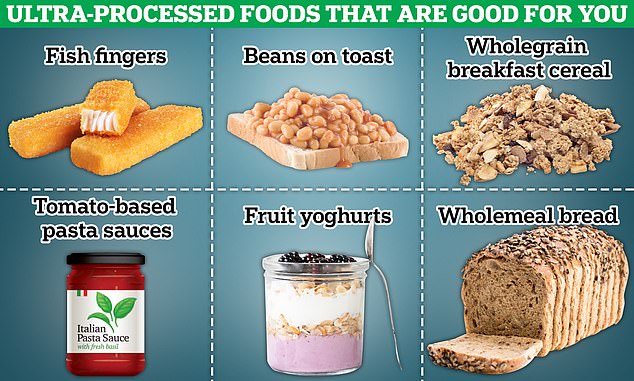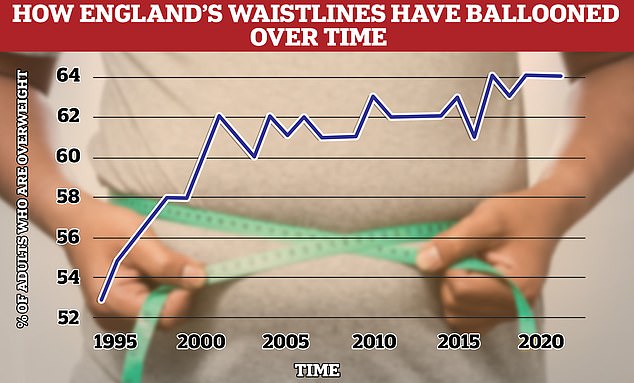Revealed: Britain eats more ultra-processed food than anywhere else in Europe, with junk food such as cakes, sweets and biscuits making up almost 60 percent of the average adult diet
They are now said to be harmful to every part of the body.
But the endless string of health warnings isn’t stopping the average Brit from consuming ultra-processed food.
Data shows that Britain consumes more ultra-processed foods (UPFs) – a category that also includes cakes, sweets and biscuits – than anywhere else in Europe.
Nearly 60 percent of an adult’s daily diet consists of junk, a report has found.
Similar figures can be seen in the US.
The Nova system, developed by scientists in Brazil more than a decade ago, divides food into four groups based on the amount of processing it has undergone. Unprocessed foods include fruits, vegetables, nuts, eggs and meat. Processed culinary ingredients – which are not usually eaten alone – include oils, butter, sugar and salt

Food experts say some UPFs can be “part of a healthy diet.” Baked beans, fish fingers and wholemeal bread all do the trick, according to the British Nutrition Foundation (BNF). Tomato-based pasta sauces, wholegrain cereals and fruit yoghurts are also ‘healthier processed foods’, says the charity
By comparison, the figures are below 20 percent in Italy, where the Mediterranean diet – beloved by experts for its plethora of health benefits – is commonplace.
Foods rich in additives have been vilified for decades for their supposed risks, with dozens of studies linking them to type 2 diabetes, heart disease and cancer.
Top scientists have even called for UPFs to be completely removed from the diet or treated like cigarettes. Still others argue that there is no evidence that the processing itself is dangerous and that some UPFS may be perfectly healthy.
Despite growing fears, consumption has increased globally in both adults and children over the past decade.
A report from the British Medical Journal last year found that the average American adult’s diet is about 57.9 percent UPF.
It was the only country analyzed of over-30s to beat Britain in terms of consumption.
France and Belgium consume only half the amount of Britain, with an average of 29.6 and 31.1 percent respectively.
The findings were based on nationally representative samples conducted in recent years.
By comparison, the inflow in Romania was about 15 percent.
UPFs refer to items that contain ingredients that people would not normally add when preparing homemade food.
These additives can include chemicals, colorings, sweeteners and preservatives that extend shelf life.
Ready meals, ice cream and tomato ketchup are some of the most beloved examples of products that fall under the umbrella term UPF, now synonymous with foods that have little nutritional value because they generally have higher sugar, salt and fat content .

Around two-thirds of over-16s in England (64 percent) are overweight, including tens of thousands who are morbidly obese. This is an increase of 11 percent from 1993, when 53 percent were considered overweight. Experts blame a sedentary lifestyle and unhealthy diet. Source: Health Survey for England 2021
They differ from processed foods, which are tinkered with to make them last longer or improve their taste, such as cured meats, cheese and fresh bread.
It comes as a major study today concluded that high UPF diets could be harmful to every part of the body.
It linked the foods to an increased risk of 32 health problems, including cancer, type 2 diabetes and mental disorders.
In the largest analysis of evidence to date, involving 10 million people, researchers also found that those who ate the most UPFs had between 40 and 66 percent greater risk of dying from heart disease.
Health experts have long called for ‘harmful’ junk food such as Coco Pops to be stripped of health claims and no longer advertised.
However, others have pointed to other lifestyle factors, such as low levels of exercise, high smoking rates, and a lack of nutrients from fresh foods consumed by people who eat a lot of UPFs, as factors that may be to blame.
Last week, TV star and author Dr Chris van Tulleken said the mass production of food is acting in a similar way to big tobacco by selling addictive products that can be harmful.
He called for ‘black label octagon’ label warnings on foods with few health benefits. Similar ones are already used in Chile.
The latest NHS data shows that 26 percent of adults in England are obese and a further 38 percent are overweight but not obese.
